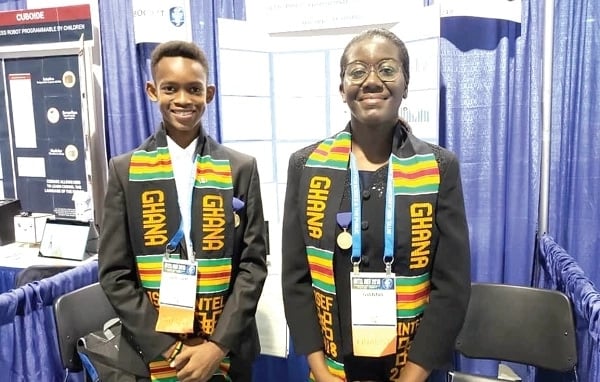Two Ghanaian students win top UN award
- The two Ghanaian students, Gianna and William have developed a computer algorithm that could detect diabetic retinopathy.
- The computer algorithm is capable of treating patience with diabetics more faster than a specialized doctor.
Two Ghanaian students have emerged winners of the United Nations (UN) Sustainable Development Goal (SDG), award at the just-ended Intel International Science and Engineering Fair (Intel ISEF) held in Pittsburgh in the United States.
The students, Gianna Nana Ama Boadi Torpey, of the SOS Hermann Gmeiner International College and William Thibaud Manirakiza of the Liberty American School, designed a computer algorithm that could detect diabetic retinopathy.
According to a Graphic.com.gh report, the computer algorithm discovers diabetic retinopathy that cause damage to the blood vessels in the tissue at the back of the eye from fundal images faster than a specialized doctor.

READ ALSO: Afia Schwarzenegger calls on 'hell fire' on Ghanaian politicians (Video)
The algorithm of the two students was selected and adjudged the best in the world for addressing a United Nations SDG this year.
Sharing their experience, the two students, in a joint statement said the ISEF programme provided a wonderful networking and learning opportunity for them to meet other young innovators from around the world who were doing amazing things in the field of science and technology.
“We also attended seminars on public speaking and scientific communication by some of the world’s finest scientific journalists. Finally, Intel provided us with hands-on training on some of their state of the art technology tools,” the Graphic.com.gh report quoted.
In a country where the doctor-to-patient ratio is quite low, Gianna and William express the hope that their technology would greatly contribute and improve the diagnosis and treatment of diabetes which affects about 93 million people globally.
The Intel ISEF is said to be the largest and most prestigious international pre-collegiate science competition in the world.
Each year, more than 1,800 student finalists earn the right to attend the Intel ISEF as a result of their excellent scientific projects chosen from over seven million applicants globally.
READ ALSO: Obengfo Hospital Director 'hot' as court orders for his full medical records
This year's programme attracted 1,792 finalists from 81 countries, representing every region of the world. The Africa region was represented by students from Egypt, Tunisia, Ghana, Nigeria, Kenya, Zimbabwe and South Africa.
The Founder of the MISE Research Programme, Mr Joel Dogoe, selectors of the Ghanaian students, stated that the Intel ISEF programme provided the young scientific minds (students) the opportunity to showcase their talents on an international stage, where doctoral-level scientists judged their work on the basis of the students’ creative ability and scientific thought, as well as the thoroughness, skill and clarity shown in their projects.
The two Ghanaian students faced about 1,200 young scientists and engineers, representing 22 scientific disciplines from leading universities and international organisations, including Stanford, Carnegie Mellon, the United States Agency for International Development (USAID) and the UN, reviewed the over 1,300 projects at the conference.
READ ALSO: Top NDC man thrown out of Kasapa FM live morning show (Video)
Ghana Trends: How Anas Aremeyaw Anas Caused a Stir With Latest Investigation | Yen.com.gh
Yen.com.gh is building a platform where Ghanaians can share local news and own experiences with each other. Witnessing an incident? Want to tell about a local problem? Know someone who is extremely talented and needs recognition? Your stories and photos are always welcome. Message us on Facebook or Instagram
Source: YEN.com.gh
